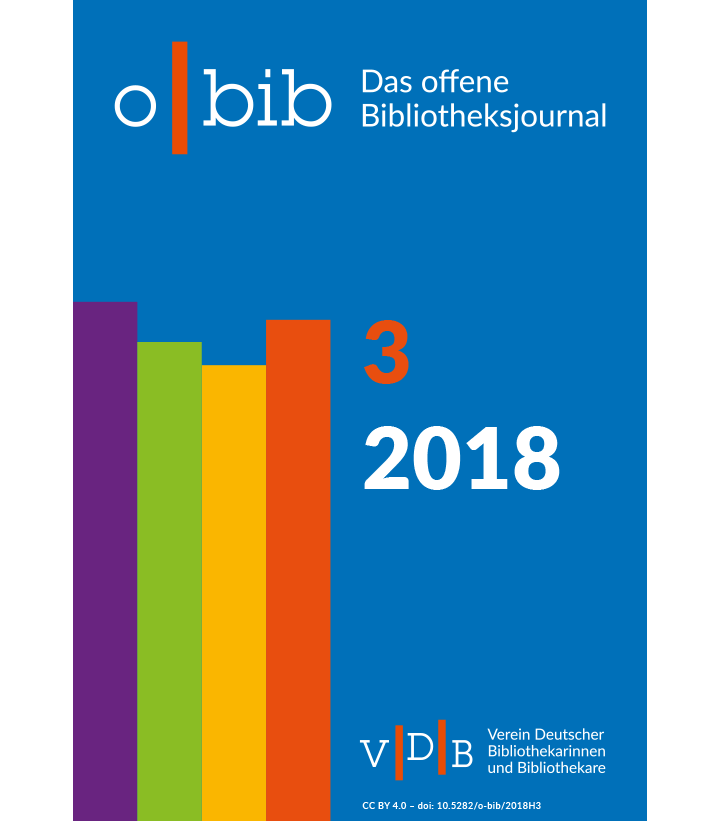Nachträglich ist nicht gleich nachnutzbar: Ansätze für integrierte Prozessdokumentation im Forschungsalltag
DOI:
https://doi.org/10.5282/o-bib/2018H3S32-45Keywords:
ForschungsdatenmanagementAbstract
In order to make research data retrievable, it must be described with sufficient metadata. It is also necessary to include the context in which the research data has come into being, so that other scientists can reproduce the research data described by the metadata. However, the documentation of this origination process is often neglected due to a lack of time in everyday research. In addition, low-threshold support in day-to-day research is often missing. At present, some methods are being developed or about to be established. In this paper, software applications designed to facilitate documentation are presented and compared with the solution currently developed in the RePlay-DH project. The approach of the virtual research environment relies on cooperation via a shared platform. The electronic laboratory notebook supports documentation in the laboratory. In contrast to workflow tracking, workflow management defines a workflow before the individual work steps are carried out. Here, the focus is set on a process-accompanying documentation. The approach of the RePlay-DH project for a solution is to support documentation of the research process with metadata through simplified workflow tracking. Special emphasis is laid on the integration in the existing work processes of scientists and scholars and easy handling.
References
Afgan, Enis, Dannon Baker, Marius van den Beek, Daniel Blankenberg, Dave Bouvier, Martin v{C}ech, John Chilton, et al. 2016. „The Galaxy platform for accessible, reproducible and collaborative biomedical analyses: 2016 update.“ Nucleic Acids Res. (Oxford University Press) 44 (W1): W3-W10.
Michael Bender, Forschungsumgebungen in den Digital Humanities. Nutzerbedarf, Wissenstransfer, Textualität. (Berlin, Boston: De Gruyter Mouton, 2016), 323. https://doi.org/10.1515/9783110463927.
Candela, Leonardo, Donatella Castelli, und Pasquale Pagano. 2013. „Virtual Research Environments: An Overview and a Research Agenda.“ Data Science Journal 12: GRDI75-GRDI81.
Deelman, Ewa, Dennis Gannon, Matthew Shields, und Ian Taylor. 2009. „Workflows and e-Science: An Overview of Workflow System Features and Capabilities.“ Future Gener. Comput. Syst. (Elsevier Science Publishers B. V.) 25 (5): 528-540. http://dx.doi.org/10.1016/j.future.2008.06.012.
Kommission Zukunft der Informationsinfrastruktur, Hrsg. 2011. „Gesamtkonzept für die Informationsinfrastruktur in Deutschland.“
Deutsche Forschungsgemeinschaft, Hrsg. 2015. „Leitlinien zum Umgang mit Forschungsdaten.“
Gärtner, Markus, Uli Hahn und Sibylle Hermann. 2018. Supporting Sustainable Process Documentation. In: Language Technologies for the Challenges of the Digital Age: 27th International Conference, GSCL 2017, Berlin, Germany, September 13-14, 2017, Proceedings, hg. von Georg Rehm und Thierry Declerck, 284--291. Cham: Springer International Publishing. doi:10.1007/978-3-319-73706-5_24, https://doi.org/10.1007/978-3-319-73706-5_24.
Himpe, Christian,Jörg Fehr, Jan Heiland und Jens Saak. 2016. „Best practices for replicability, reproducibility and reusability of.“ AIMS Mathematics 1 (3): 261-281. doi:10.3934/Math.2016.3.261.
Kaden, Ben, und Simone Rieger. 2015. „Usability in Forschungsinfrastrukturen für die Geisteswissenschaften.“ In TextGrid: Von der Community – für die Community, Herausgeber: Heike Neuroth, Andrea Rapp und Sibylle Söring.
Lossau, Norbert. 2011. „Virtuelle Forschungsumgebungen und die Rolle von Bibliotheken.“ Zeitschrift für Buch-und Bibliothekswesen 58 (3-4): 154-163. http://resolver.sub.uni-goettingen.de/purl?gs-1/7057.
Müller, Joachim. 2005. Workflow-based Integration: Grundlagen, Technologien, Management. Berlin: Springer. doi:https://doi.org/10.1007/b138228
McPhillips, Timothy M., Tianhong Song, Tyler Kolisnik, Steve Aulenbach, Khalid Belhajjame, Kyle Bocinsky, Yang Cao, et al. 2015. „YesWorkflow: A User-Oriented, Language-Independent Tool for Recovering.“ CoRR abs/1502.02403. http://arxiv.org/abs/1502.02403.
Neuroth, Heike, Fotis Jannidis, Andrea Rapp, und Felix Lohmeier. 2009. „Virtuelle Forschungsumgebungen für e-Humanities. Maßnahmen zur optimalen Unterstützung von Forschungsprozessen in den Geisteswissenschaften.“ BIBLIOTHEK Forschung und Praxis (Walter de Gruyter GmbH & Co. KG) 33 (2): 161-169.
Reich, Michael, Ted Liefeld, Joshua Gould, Jim Lerner, Pablo Tamayo, und Jill P Mesirov. 2006. „GenePattern 2.0.“ Nature Genetics 38 (5): 500-501. http://www.nature.com/doifinder/10.1038/ng0506-500.
Stodden, V., M. McNutt, D. H. Bailey, E. Deelman, Y. Gil, B. Hanson, M. A. Heroux, J. P. A. Ioannidis, und M. Taufer. 2016. „Enhancing reproducibility for computational methods.“ Science (American Association for the Advancement of Science (AAAS)) 354 (6317): 1240–1241. http://dx.doi.org/10.1126/science.aah6168.
Wilkinson, Mark D., Michel Dumontier, Ijsbrand Jan Aalbersberg, Gabrielle Appleton, Myles Axton, Arie Baak, Niklas Blomberg, u. a. 2016. The FAIR Guiding Principles for scientific data management and stewardship. Scientific Data 3: 160018. doi:10.1038/sdata.2016.18, https://doi.org/10.1038%2Fsdata.2016.18.
Downloads
Published
Issue
Section
License
Copyright (c) 2018 Sibylle Hermann, Uli Hahn, Markus Gärtner, Florian Fritze

This work is licensed under a Creative Commons Attribution 4.0 International License.





